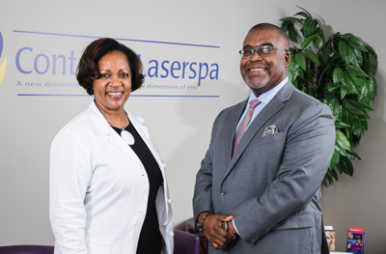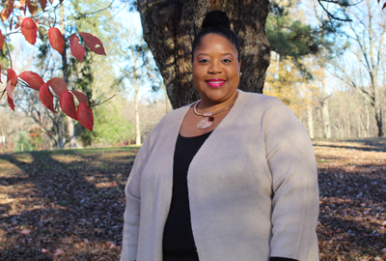Talking shop
Black entrepreneurs, especially women, face extra challenges
Kate Andrews //January 29, 2021//
Talking shop
Black entrepreneurs, especially women, face extra challenges
Kate Andrews //January 29, 2021//
Charis Jones, by any measure, is a major success.
Her online retail brand, Sassy Jones, was the top-ranking Virginia business on the 2020 Inc. 5000 list of the fastest-growing U.S. private companies, based on its 2019 growth. The Richmond-based fashion accessories and beauty e-commerce company reaped $14 million in revenue last year, three-and-a-half times its revenue from the previous year. In 2021, Jones plans to roll out new cosmetics, clothing, shoe and home décor lines.
“We’re just waiting to see how good it can get,” she says. But when she was starting out in 2013, Jones had to sell her Mercedes C320 for $3,200 to launch her business. She didn’t bother to seek a bank loan because she didn’t think she’d be approved.
Black women helm 42% of new women-owned businesses nationally and 36% of all new Black-owned businesses, according to 2018 U.S. Census data. And their companies are uniquely vulnerable in this economic climate.
One major issue is lack of financial resources. A JPMorgan Chase & Co. Institute study released in September 2019 found that small businesses in majority-Black communities were unlikely to be able to pay two weeks’ worth of bills with cash on hand.
The roots of Black entrepreneurship are deep, however, tracing back centuries to enslaved people who used their skills to purchase their freedom and start small businesses.
By the dawn of the 20th century, Maggie Lena Walker became the first Black woman in the United States to charter and run a bank: Richmond’s St. Luke Penny Savings Bank. “Let us have a bank that will take the nickels and turn them into dollars,” Walker said in 1901. Richmond was the home for other Black-owned banks that started in the late 1800s and early 1900s, providing financial services for Black clients whose business wasn’t welcome at white banks.
“Black people — and Black women especially — are shut out of traditional employment, but our culture applauds the hustler who responds to exclusion by striking out on her own,” wrote Tressie McMillan Cottom, a University of North Carolina sociology professor who studies Black entrepreneurship, in a fall 2020 article in Dissent magazine. “As brands and digital platforms celebrate grit and urge us to ‘respect the hustle,’ the realities of who succeeds and who stays struggling are lost.”

family medical practice and medi-spa. Photo by Stephen Gosling
In other words, amid the success stories are many Black entrepreneurs who face major challenges to economic success, starting with lack of capital.
“The intergenerational wealth gap is very important,” says Maurice Jones, the Norfolk-based CEO and president of Local Initiatives Support Corp., a government- and privately-funded national organization that provides funding for economic development in financially challenged areas. “White families have 10 times what Black families have.”
An October 2020 Brookings Institution study found that the net worth of an average white family in 2016 was $171,000, and the average net worth of a Black family was $17,150. That disparity extends to business ownership, leaving Black entrepreneurs with fewer resources during downturns like the current pandemic-sparked recession and the 2008-09 Great Recession.
Still standing
Edna Howard started her Fairfax-based empowerment coaching business in 2017 with $3,500 out of her own pocket. She has applied for multiple grants during the pandemic — from companies including Visa, Verizon, Google and many others — “just trying to get the capital, really, to build up the virtual workshops.” Howard sought funding to purchase equipment to conduct webinars, which replaced in-person gatherings due to the pandemic. However, as of December 2020, none of her grant applications had been approved.
Art Jackson and Dr. Tammy Jones, business partners in Jones’ Fairfax County family medical practice and a medi-spa that offers Botox, laser hair removal and body sculpting, had grand plans after they started the primarily self-funded businesses in March 2019. Jones, too, was not able to get a business loan — which surprised her.
As a hospital-affiliated family practice doctor, she had a healthy savings account, a retirement fund and a “credit score that was far beyond what is average,” she says. Banks still said no.

“It was a leap of faith,” says Jackson, whose background is in operations management. He and Jones estimated, after a good first year, that their businesses would break even by March 2020.
Instead, state COVID-19 restrictions forced the spa to close for a few months. Jones moved her medical practice online, seeing patients through telemedicine appointments, but Jackson says it was hard going because the medical practice, which they purchased from a retiring doctor, still needed more patients for it to be financially sustainable.
Although the spa and medical practice reopened for some in-person appointments in June 2020, Jones says, “I’ve pretty much exhausted my savings and tapped into my retirement account. We have invested in the stock market during the downturn, sinking any money we’ve made into the businesses. I’m not broke, but I’ve taken a loss.”
Jones and Jackson were able to get a federal Paycheck Protection Program (PPP) loan that helped them pay their employees last spring, but their applications for the Small Business Administration’s Economic Injury Disaster Loans (EIDLs) were turned down. “The response is that I didn’t experience an economic disaster,” Jones says with a dry chuckle.
A late-fall rush of Botox and filler clients was their saving grace, Jones says. “Our goal is to hobble along until there is a vaccine [broadly available] and … customers are comfortable coming in.”
Making connections
Starting a business is tough for most people unless they have a significant financial cushion and a close circle of peers, friends and colleagues willing to give advice. For Black entrepreneurs, those connections sometimes take longer to forge.
Richmond-area staffing and telework consultant Robin Mack started her company, Mack Global LLC, in 2008 but it wasn’t earning enough, so she had to take another full-time job from 2012 to 2015 while continuing to work nights on her own business.
Now, Mack has a five-year contract with the Virginia Department of Rail & Public Transportation’s Telework Virginia program, among other clients, including all branches of the military and the U.S. Justice and Defense departments. With so many people working remotely due to the pandemic, Mack found her company in demand, although current financial conditions delay some of her clients’ payments, she notes.
The turning point for Mack was finding a community financial institution that she considers “my partner in business,” First Citizens Bank, which she found through the Metropolitan Business League, a Richmond-based nonprofit business association that supports small, women- and minority-owned businesses in Central Virginia.
“It took me some time to get there. Metropolitan Business League was very instrumental in connecting the dots. I did struggle from a financial standpoint in finding a bank that would support me.” Today, Mack feels supported and also well-informed through that relationship, and she has connections and a track record that brings more business her way.
Charis Jones, whose success is based on building relationships with loyal customers — Sassy Jones’ advertising budget in 2020 was $0 — advises entrepreneurs to “trust your gut” and also talk directly to customers, not just relying on data or online surveys. Schedule a Zoom conference with your best clients, she says.
Dr. Rosemary Ahanor, a Nigerian-born dentist who has lived in the Washington, D.C., region for a decade, opened her Reston-based dental practice in August 2020. So far, it’s been tough but manageable, she says.
“Black business owners may not have that same network” that many white business owners do, she acknowledges, so she dipped into her funds to hire a marketing consultant, “so the community knows I exist.”
Slowly, Ahanor found some parts of the community she needed — the Northern Virginia Black Chamber of Commerce and the local chapter of SCORE, which offers advice and training for entrepreneurs. Also, her husband has a psychiatric practice in Northern Virginia, so she benefited from his experience. Facebook groups for dentists and other entrepreneurs helped too.
“If you were not born and raised here, you have to ask the right questions,” Ahanor says. So far, she’s found new patients by offering free consultations and a membership program that includes discounts.
Sheila Dixon, who started as executive director of the Northern Virginia Black Chamber of Commerce in February 2020, has relied on her skills as a branding consultant in her new role.
With 108 member businesses, she’s led webinars during the past year focusing on getting loans, building relationships and finding corporate sponsors. But the chamber is still not where Dixon wants it to be in terms of getting its own grants and funding.
“We were partnering with everyone and all those things, but we just needed that visibility and consistency,” Dixon says. “We were in the circles but not getting the same opportunities. We know what’s happening here in the community, and we want to be that place. Some chambers are receiving funding, and our chamber is not.”
For Black-owned small businesses, especially during the beginning stages, “capital is the No. 1 barrier,” said Tracey Wiley, former director of the state Department of Small Business and Supplier Diversity, which manages Virginia’s Small, Women-owned and Minority-owned (SWaM) business certification program. Another challenge, she said, speaking in December 2020, is that, “from a procurement standpoint, people do business with the people they know.”
SWaM certification helps, Wiley said, because the approximately 15,000 state-certified businesses now are in front of state agencies seeking contractors. SWaM businesses have access to loans and grants, including an investment fund that reimburses angel investors up to 25%, as well as Virginia’s Scaling4Growth accelerator program.
Since all small businesses can qualify, SWaM is a gender- and race-neutral program, but Wiley said that the traditional system of awarding state contracts to businesses with long track records and agency relationships excludes many minority-owned businesses.
“There’s still some level of subjectivity entering in. We have very qualified businesses,” she said. “There’s still historical and traditional and systemic things going on. We’re essentially missing the mark.”
Related Articles
Leadership lessons
Black business leaders offer wisdom, advice for next generation
Disrupting racism
Janice Underwood leads the state’s efforts to create a more equitable culture


















